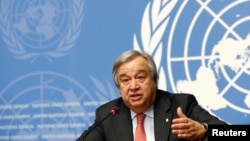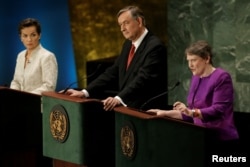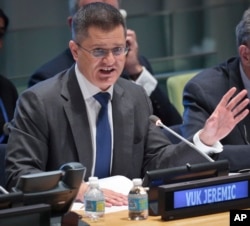In the race to be the world’s top diplomat, former Portuguese Prime Minister Antonio Guterres has positioned himself as the one to beat.
In a fifth round of U.N. Security Council informal ballots on Monday, Guterres came first — for the fifth consecutive time. He was the only candidate of the nine to garner the necessary minimum nine votes. He received 12 votes encouraging his candidacy, two discouraging it and one expressing no opinion.
Many diplomats believe one of the two "no" votes is from New Zealand, which is trying to raise the fortunes of its former prime minister Helen Clark who is also in the race, but has been having a disappointing showing so far. Monday’s vote left her at the bottom of the pack.
The bigger question remains whether a veto-wielding member of the council is casting the other negative vote. Some have speculated Russia might block Guterres — a Western European — in favor of an Eastern European candidate.
Eastern Europe has fielded a total of six candidates in the race, saying they are the only region not to have held the post and hope to fill it starting January 1, 2017.
Their candidates had a solid showing in Monday’s informal ballot, with former Serbian foreign minister Vuk Jeremic coming in second and current Slovakian foreign minister Miroslav Lajcek coming third. The two men swapped places from the last round of voting, in which Lajcek came second.
But both men had only eight countries supporting their candidacies, putting them below the threshold of nine and far behind Guterres in support.
Bulgaria’s candidate, Irina Bokova, has been the subject of much speculation. After a fifth place showing in the previous straw poll, rumors began to circulate that if she did not place first or second on Monday Sofia would withdraw her and replace her with Kristalina Georgieva, an EU commissioner.
After a week of campaigning on the sidelines of last week’s U.N. General Assembly, Bokova placed a disappointing fifth (fourth place was a tie) with only six countries encouraging her candidacy — one less than last time — and two more discouraging her.
The council will hold its next — and possibly most decisive straw poll — on October 5. During that vote, the permanent council members — Britain, China, France, Russia and the United States — will have colored ballots and their “discourage” votes will equal vetoes, which could torpedo candidates’ aspirations.






